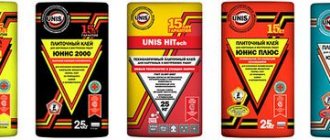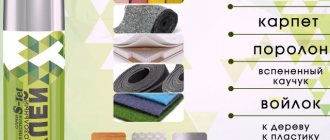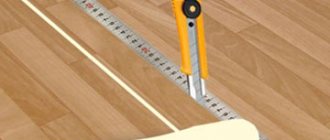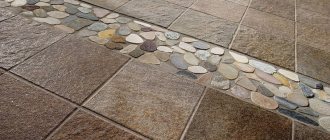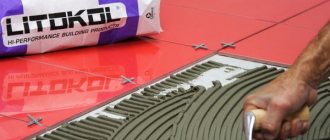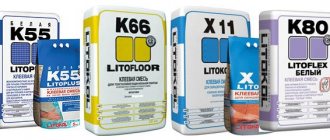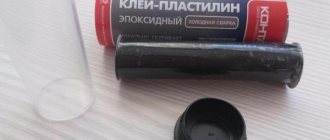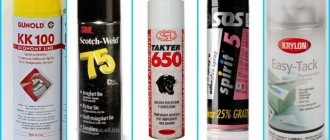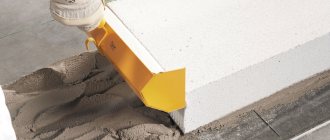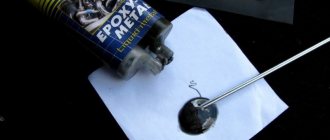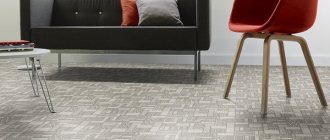- Characteristics of tile adhesive
- Classification of adhesive for porcelain tiles
- Tile adhesive for exterior finishing
- Tile adhesive for interior decoration
- Universal tile adhesive
- Moisture-resistant tile adhesive
- Reinforced tile adhesive
- Fast-curing tile adhesive
- What you need to know before buying
“The porcelain tile is capricious, doesn’t listen, and falls off.”
We sometimes encounter similar comments about one of the best finishing materials. Cersanit specialists decided to understand the reasons why porcelain tiles from time to time do not want to be friends with customers. It turned out that he was really guilty, just not of what he was accused of. It turned out that not every adhesive is suitable for installing a durable, rather heavy and practically non-moisture-absorbing material. Standard tile adhesive, mixed with water, is absorbed by the porous surface of a plastered wall or cement floor screed - this is how it is securely fixed to the surface. But moisture-resistant porcelain tiles do not have the ability to absorb substances: neither water nor glue. As a result, the slab simply peels off from the surface or, over time, begins to creak when walked.
Not everything is simple with compounds made specifically for the installation of porcelain tiles. They differ in adhesive ability, elasticity and have different coupling mechanisms. That is why the question of which adhesive is most suitable for porcelain tiles arises before everyone who has started a renovation and has already stocked up on material.
Characteristics of tile adhesive
The adhesive is selected based on the dimensions of the slab. The 30x60 cm and 22x90 cm formats are installed using specific adhesive compositions with different characteristics. In addition, the finishing area is important. Bathroom adhesive differs from external adhesive in a set of special additives.
Main characteristics of adhesives for porcelain stoneware:
- Frost resistance: this criterion is important when the material is laid outdoors and in unheated rooms; it allows the glue to withstand low temperatures when moving from plus to minus. To measure the adhesion force of the sample to the base, a sample of cement adhesive saturated with water is checked by cyclically passing through zero. According to GOST, all adhesive compositions above class C1 must withstand 25 cycles.
- Moisture resistance: in wet areas, both the finishing material and the adhesive on which it is mounted must be resistant to moisture. Otherwise, the finish will not last long.
- Deformability: surfaces subject to vibration (building facades, walls and floors) are finished with porcelain stoneware. Also on large-format tiles there is surface tension, which often affects the separation of the material from the base. Adhesive compositions with a high elasticity index - S1 - allow you to avoid tile peeling. They are recommended for facades, vibration loads, elevators, for formats with a slab side of more than 1 m. Adhesive compositions with elasticity index S2 are recommended for extra-large formats with a slab side of 1.5 m or more and/or for installation without grout joints.
- Degree of adhesion (adhesion): A property that ensures the strength of the connection of materials.
- Heat resistance: if porcelain stoneware is used to decorate stoves, fireplaces or is mounted on a heated floor system, its characteristics should not change due to exposure to heat.
According to GOST, the main characteristics of the glue have a letter designation:
The characteristics that you should pay attention to first of all are the degree of adhesion and deformability. All other indicators are variable and correlate with the type of room, type of porcelain stoneware and microclimate characteristics.
Consumer reviews
Basically, the general opinion comes down to the use of mixtures for specialized purposes in order to avoid subsequent rework.
- Professional masons mostly speak positively about Gerfest.
- Moreover, when it comes to interior and exterior finishing work, where there is no heating, then CM11 is the best option.
- If the floors are heated, then CM117 would be a more suitable option. Pools are usually finished with a mixture of CM17.
- Those who want to speed up the work should pay attention to CM14, which allows you to start grouting after just three hours.
The domestic analogue “Hercules” is characterized by low cost and excellent adhesion.
It is not a problem for him to ensure the quality of installation, both on a brick base and on concrete and plaster. Typically, it is used to carry out work on cladding steps, paths and stairs close to the building.
“Plitonite” can provide increased strength.
Classification of adhesive for porcelain tiles
There are many types of adhesives for porcelain tiles. They differ in composition, cost, scope and class. There are adhesives:
- Ready-made: do not require kneading and are quite expensive.
- One-component: mixed with water before application.
- Multicomponent: professional adhesives with additional properties.
Cement adhesive mixtures in Russia are divided into several classes according to GOST:
- Class C0 - appeared only in Russia; according to European standards, such a product is not considered tile adhesive. In the Russian Federation, such mixtures cannot be used for installing porcelain tiles, even if manufacturers write that they are moisture resistant. Using class C0 adhesive, ceramic tiles with a water absorption of at least 5% are laid in warm rooms. Often, on packages of class C0 glue, “POCKET GRANITE” is written in large print and in small print it is indicated that the glue can be used for installing porcelain tiles along with additives, but any changes in the composition of the mixture and its further use are at the buyer’s own risk. Porcelain tiles may simply fall off over time due to unsuitable glue.
- Class C1 cement mixture is an adhesive composition with an adhesion index of at least 0.5 MPa (MPa - megapascals. Pressure and mechanical stress are measured). In order to tear the slab off the wall, you need to apply a uniform force per 1 m2 equal to 500 kg. The adhesive is suitable for use indoors and outdoors, in humid environments and during temperature changes. The composition can remain open for 20 minutes.
- C2 is a cementitious adhesive with enhanced adhesion. It is used for installation of large-format or heavy porcelain tiles. This quality is invaluable when finishing vertical surfaces.
The international classification subdivides adhesives for porcelain tiles depending on their purpose:
- for exterior decoration;
- for interior work;
- for floor finishing (more liquid);
- universal;
- reinforced;
- moisture resistant;
- fast-hardening;
- elastic.
If you know all the parameters of the upcoming repair, you can select the tile adhesive yourself using the table:
Some tips on laying tiles from the experts
When laying wide-format tiles on floors, you need to make sure that the base is strong, since removing the slab and installing it again will not work.
6mm tiles can be safely laid on floors and walls if the manufacturer indicates that they are suitable for floor use. If the manufacturer indicates that the tiles are made only for use on the wall, then laying them on the floor is highly undesirable, even if the material is 10 mm or more thick.
Large formats must be laid by a team of at least two people, this is due to both the severity of the work and the complexity of installation. After applying the adhesive, the tiles become very heavy, and the installation time is quite limited after preparing the mortar.
Use professional equipment to transfer tiles and lay them; suction cups must be used with vacuum suction.
Measure twice, cut once, this saying also applies when cutting large-format material.
The cut must be made on a special cutting machine, removing the film from the surface, if any, and if you need to cut out a small part, then use a very thin cutter with a diamond coating.
When transferring, do not place the material on a hard surface; place a soft substrate of sufficient thickness, usually this thickness is equal to two cardboard boxes folded in half. This recommendation will help prevent the edge from chipping off the edge of the tile.
Fast-curing tile adhesive
Fast-curing adhesive
allows you to almost immediately fix the tiles to the surface. This glue is resistant to moisture, provides instant adhesion, is immune to temperature changes, but it does not forgive mistakes. Do not forget that the type of surface also determines the adhesion coefficient. The more complex the surface (plasterboard, plastic, metal, glass), the higher this indicator should be - from 1 MPa. For standard surfaces (concrete, brick, gas block) glue with 0.5 MPa will be sufficient.
Instead of an epilogue
A review of the market for the materials in question has established that it is, for the most part, dominated by brands from a foreign manufacturer, or products manufactured in the Russian Federation under a foreign license. The Russian manufacturer is poorly represented, but its products are the most adequate in terms of price-quality ratio. Professionals recommend purchasing adhesives only from trusted online stores, or better yet, from retail chains, in order to be able to quickly contact the seller if any complaints arise regarding the quality of the product.
What you need to know before buying
Let's summarize the most important points:
- Standard tile adhesive C0 or without class indication is not suitable for porcelain tiles.
- The larger the slab format, the higher the adhesion coefficient of the composition (adhesion) should be.
- For difficult environmental conditions and non-standard surfaces, a special adhesive is required, not lower than C1.
- Universal and reinforced adhesives are a marketing ploy; it is important to focus on the class of adhesive.
- For large-format slabs with a side of more than 1 m and for vibration loads, it is important to use adhesives of class S1 and higher.
- Quick-hardening compounds are difficult to use and do not forgive mistakes during installation.
Mapei Keraflex Maxi
Volume : 25 kg.
Price : 1,461 rub.
Mapei Keraflex Maxi adhesive is used for laying ceramic and natural stone tiles. There are quite a few options for using glue: it can be used to treat floors, cement screeds, gypsum bases, walls, etc. If you need a good repair adhesive, you can count on Mapei Keraflex Maxi .
The adhesive has impressive characteristics, which makes it stand out on the market of construction materials: it has excellent adhesion, good resistance to alkalis and solvents. Buyers give this glue 5 stars out of 5 - feel free to buy it for work!
Weber Easy Fix
Volume : 25 kg.
Price : 275 rub.
If you are looking for high-quality and reliable glue when thinking about repairs, then you have found it! Weber Easy Fix shows excellent adhesion and ductility. Reliably adheres tiles and is suitable for small format porcelain tiles.
If there is a need to glue large-format tiles, then to enhance the effect and reliability, it is necessary to coat the wall and the back side of the tile with glue. This glue also has disadvantages - it is not suitable for heated floors. The glue mixes well, and all the lumps dissolve in the process.
Unis Plus
Volume : 25 kg.
Price : 391 rub.
Absolutely universal glue Unis Plus will cope with most tasks. Some people have been using it for several years and are happy with everything. The composition of the glue is quite simple; it contains Portland cement, modifying additives and mineral filler.
Unis Plus is suitable for use on any substrate, even plaster. Suitable for exterior and interior use. Moreover, in places with high traffic and constant precipitation (snow, rain) it performs excellently. Masters consider this glue to be the best, should we believe them?
Video - How to lay porcelain tiles
This is basic information, after studying which you can easily choose the optimal adhesive for porcelain tiles. If you have any doubts, you can always consult with specialists in the store.
The main thing is to choose a good retail outlet where experienced sellers work. We also recommend that before purchasing this or that composition, be sure to read detailed information about it on the Internet and customer reviews. This way you can form your own opinion about each composition even before purchasing and using it.
Kinds
The choice of one or another glue always depends on the place where it will be used and what surface it is attached to. You should also take into account the size of the tile and the thickness of the adhesive applied.
The following types of adhesive compositions can be distinguished:
The two-component product is a dry powder that must be dissolved in water. It may consist of various kinds of components. It is characterized by high elasticity. Before starting work, you must mix all the ingredients using a professional mixer. For quick setting, a frost-resistant solution is used.
- One-component - kerabond, which is based on cement. Suitable for external and internal laying of porcelain tiles. Ready to use immediately after purchase. It dries for quite a long time, this helps large tiles to better adhere to the adhesive element.
- A type of two-component adhesive is polyester, made on a resin basis.
- The reinforced adhesive composition is designed for better adhesion to the material.
FAQ
Which spatula is best for applying the composition?
V-shaped tools use less solution than U-shaped spatulas.
What determines the thickness of the applied adhesive layer?
The thickness of the layer is determined by the declared characteristics of the composition, as well as based on the size of the tile fragments - the smaller the element, the thinner the adhesive coating required for it.
Does the level of moisture absorption of the tiles affect the consumption of the mortar?
A facing material with high absorbency will absorb some of the glue more strongly, which will require more mixture.
Do I need to level the wall before laying tiles?
Uneven surfaces will require additional glue consumption to fill them, and the risk of the finished cladding coming off the wall will also increase.
What is highly elastic adhesive used for?
Compositions with increased elasticity make it possible to cladding resonating bases from gypsum plasterboard or plywood, as well as lay tiles on problem surfaces that prevent the absorption of glue.
Correctly selected tile adhesive will allow you to complete tiling work quickly and efficiently, avoiding unnecessary costs for consumables, and keep the finishing result in its original condition for a long time.
KREPS Reinforced
Volume : 25 kg.
Price : 607 rub.
On the market, KREPS Reinforced is positioned as a tile adhesive, but judging by the reviews, it can do a lot. The adhesive is suitable for fastening all types of ceramic tiles and porcelain stoneware, transparent materials, as well as mosaics. The hardened solution has high adhesion to substrates made of different materials.
Pay attention to the date of manufacture, the shelf life of the glue is 1 year from its date. If you trust customer reviews, one of them shared: “5 years have passed since the repair, the glue is performing well. The tiles in the kitchen are in place and everything is fine with the floor.” KREPS Reinforced is a decent glue, consider purchasing it.
Litokol Litoplus K55
Volume : 25 kg.
Price : 787 rub.
Renovating an apartment is always a big expense; you want everything to be done efficiently. But sometimes you can save money, because today is the time when you can read reviews from customers who managed to buy a cheap but high-quality product. Litokol Litoplus K55 is a good and relatively inexpensive (compared to others) glue.
We can roughly highlight its main advantages:
- white consistency;
- freezes well;
- holds perfectly;
- has no smell.
Litokol Litoplus K55 glue is a real find for those who decide to start a renovation! It does not emit the unpleasant odor characteristic of many adhesives, and it is quickly washed off the tools. The glue hardens quickly and well - do you really need anything else from the glue?
Kerakoll Superflex Eco A+B
Volume : 8 kg.
Price : 5,200 rub.
Kerakoll Superflex Eco A+B two-component polyurethane adhesive is suitable for all types of substrates, be it wood, metal or porcelain stoneware. The manufacturer recommends following the temperature rules for working with glue -40 °C to +110 °C.
Kerakoll is an Italian company founded in 1986. Today it is one of the leading producers of materials and services in the applied chemical industry. The company boasts an abundance of assortment, which includes more than 500 products, the main of which are reliable adhesive compositions.
